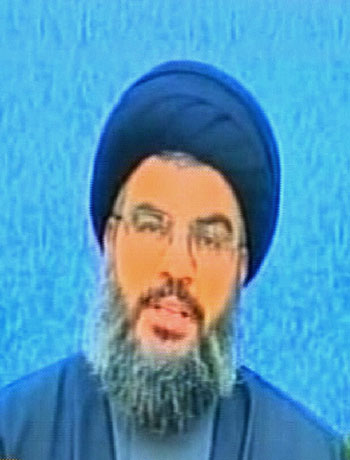
Hezbollah leader Hassan Nasrallah addresses Lebanon in a speech on his party-run Al-Manar televison (AFP)
BEIRUT (Reuters) -Israeli air strikes killed 23 people in Lebanon on Monday and Israel dismissed as premature a proposal for an international military force to help end Hizbollah rocket attacks into the Jewish state.
Raids destroyed two army posts on the northern Lebanese coast, killing at least six Lebanese soldiers, and damaged the homes of Hizbollah officials in eastern Lebanon, killing 11 people in over 60 strikes on the sixth day of violence.
Four more people died in strikes south of Beirut. Several thunderous blasts echoed over the capital and black smoke rose from a blazing fuel storage depot in the Christian suburb of Dora. Civilian installations, petrol stations and factories elsewhere were also hit, security sources said.
In the occupied West Bank, Palestinian gunmen ambushed a group of Israeli troops, killing one and wounding at least two in the old city of Nablus, witnesses and military sources said.
U.N. Secretary-General Kofi Annan said Security Council members will start hammering out a detailed agreement on deploying a multilateral security force to Lebanon.
British Prime Minister Tony Blair said the force would be essential to stop Hizbollah rocket attacks and give Israel a reason to halt its devastating strikes which have wrecked roads, bridges and power plants across Lebanon.
But Israel said it was too soon to talk of deploying the force. “We’re at the stage where we want to be sure that Hizbollah is not deployed at our northern border,” government spokeswoman Miri Eisin said.
Hizbollah, which captured two Israelis soldiers and killed eight others last week, is seeking the release of Lebanese and Palestinian prisoners held by Israel. It has not commented on international efforts to halt the fighting.
Israel is demanding the disarming of Hizbollah in line with U.N. Security Council resolutions — a task that is beyond a fragile Lebanese government dependent on consensus among rival sectarian groups.
Lebanon, just emerging from three decades of Syrian tutelage, fears that any attempt to tackle Hizbollah directly would re-ignite civil war and split its army.
Hizbollah rocketed Haifa on Sunday, killing eight people in its deadliest attack on Israel, prompting Prime Minister Ehud Olmert to warn of far-reaching consequences for Lebanon.
Hizbollah chief Sayyed Hassan Nasrallah said the rocketing of Haifa, Israel’s third-biggest city, was retaliation for Israeli killing of civilians and promised more “surprises.”
Israel’s army later said Hizbollah rockets struck a town 50 km (33 miles) south of the border. Hizbollah said it had also rocketed the towns of Nahariya and Acre in northern Israel.
An Israeli army spokesman said Hizbollah had fired about 20 rockets at Israel overnight, wounding several people. More than 100 rockets had crashed across the border in 24 hours, it said.
An Israeli newspaper said Israel’s offensive had so far destroyed a quarter of Hezbollah’s fighting capabilities.
It has also killed 176 people and wounded more than 500, Lebanon’s health ministry said. All but 13 of them were civilians. The dead include seven Canadians killed in a strike on a southern village on Sunday.
Twenty-four Israelis have been killed in the fighting, including 12 civilians hit in rocket attacks.
France, the United States, Britain and a host of other nations scrambled to evacuate their citizens from Lebanon. More than 1,000 Germans, mostly of Lebanese origin, gathered in Beirut’s Hamra district on Monday to await evacuation.
Thousands of foreigners have fled overland to Syria since Thursday, despite Israeli air strikes on main roads.
Israel’s campaign in Lebanon followed the launch of its offensive in the Gaza Strip on June 28 to try to retrieve another captured soldier and halt Palestinian rocket fire.
Israeli air strikes on Monday flattened the eight-storey Palestinian Foreign Ministry building in Gaza City and gutted the offices of a Hamas-led force in the northern Gaza Strip.
Al-Aqsa Martyrs Brigades, an armed wing of President Mahmoud Abbas’s Fatah faction, claimed responsibility for the Nablus ambush, in which a bomb targeted an Israeli patrol.
G8 leaders meeting in St Petersburg on Sunday said they wanted to “create conditions for a cessation of violence” in Lebanon and Gaza, insisting first on the release of the Israeli soldiers and an end to Hizbollah and Hamas rocket attacks.
“These extremist elements and those that support them cannot be allowed to plunge the Middle East into chaos and provoke a wider conflict,” the leaders said in a statement which also urged Israel to be restrained in its response.

A fire fighter works while smoke rises from a factory after it was struck by an Israeli warplane missile at the outskirts of southern Lebanon (AP)

A Muslim Lebanese family reads the holy Quran in a bomb shelter (AFP)
